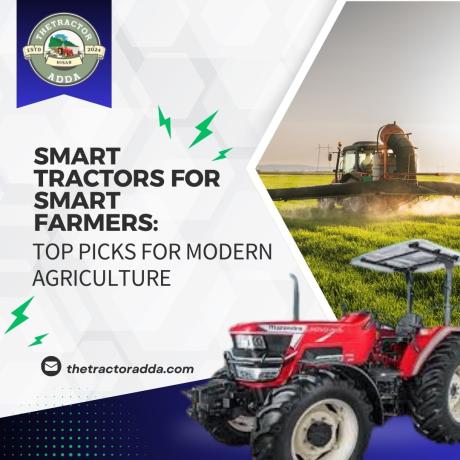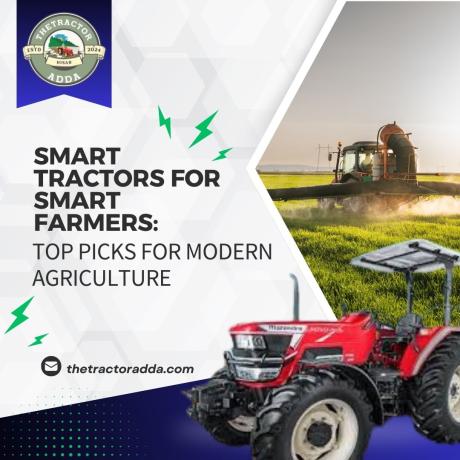Smart Tractors for Smart Farmers: Top Picks for Modern Agriculture

Blog Description
Indian agriculture is stepping into a new era—one where technology and tradition go hand-in-hand. With climate challenges, labor shortages, and the growing need for precision, today's farmers are not just cultivators—they are agri-entrepreneurs, and their tractors must match their ambitions.
Enter smart tractors—machines that do more than plough and haul. They are intelligent, connected, and built to help farmers increase productivity, reduce costs, and work with greater precision.
In this blog, we dive into the most reliable and advanced smart tractors available in 2025 and explore why these machines are becoming a must-have for the modern Indian farmer.
What Makes a Tractor "Smart"?
A smart tractor goes beyond the basics of power and design. It integrates digital technologies and automation to support decision-making and reduce manual labor. Some common smart features include:
- GPS-based Auto-Steering Systems: For straight-line farming and reduced overlap in field operations.
- Telematics and Live Tracking: Monitor tractor usage, location, and health remotely.
- Sensor-Based Alerts: Notifications about oil levels, fuel efficiency, and engine performance.
- Mobile App Integration: Farmers can connect their tractors with mobile apps for real-time updates and diagnostics.
- AI and Data Analytics: Receive suggestions based on soil type, crop, and tractor behavior.
These features contribute to a more controlled, data-driven farming approach, ensuring that every drop of fuel, every second of operation, and every inch of fieldwork counts.
Why Smart Tractors Matter in 2025
The Indian farming landscape in 2025 is being reshaped by:
- Increased demand for precision agriculture
- Need to optimize costs amidst rising fuel and labor prices
- Youth entering farming looking for tech-savvy solutions
- Government initiatives supporting digital farming tools
With these changes, smart tractors are no longer a luxury—they are fast becoming a necessity.
Top Smart Tractors for Indian Farmers in 2025
Mahindra Novo 755 DI – Telematics Ready Powerhouse
Mahindra has long been a trusted name in Indian agriculture. The Novo 755 DI combines rugged strength with smart connectivity.
- Power: 55–75 HP
- Smart Features: Mahindra DigiSense, app-based monitoring, service alerts
- Ideal For: Multi-crop farming, sugarcane fields, and transport
- Benefits: Predictive maintenance, location tracking, engine diagnostics
John Deere 5310 Trem IV – Precision on Every Pass
Known for its global excellence, John Deere brings GPS-powered guidance and cloud connectivity to Indian farms.
- Power: 55 HP
- Smart Features: JDLink telematics, automatic steering, yield mapping
- Ideal For: Hilly terrains, commercial farming
- Benefits: Precision farming, reduced overlaps, optimized inputs
Sonalika Tiger DI 75 4WD – Smart Sensors, Smarter Farming
Sonalika has become a front-runner in smart farming by introducing intelligent sensor-based technology.
- Power: 75 HP
- Smart Features: Telematics for clutch, PTO, and engine health
- Ideal For: Tough terrains, export farming
- Benefits: Low downtime, heavy-duty capabilities, efficient fuel use
Massey Ferguson 2635 Smart – Cloud-Synced Farming Companion
TAFE's Massey Ferguson series blends old-school reliability with cloud-era technology.
- Power: 75 HP
- Smart Features: Cloud sync, advanced diagnostics, precision controls
- Ideal For: Row crop farming, orchards, vineyards
- Benefits: Precision crop care, ease of monitoring, reduced manual effort
Escorts Digitrac Series – Connected Farming Experience
Escorts’ Digitrac series focuses on bridging the digital divide in Indian farming with smart, cost-effective tractors.
- Power: 47–60 HP
- Smart Features: Mobile diagnostics, location alerts, service scheduling
- Ideal For: Small and medium farms, vegetable farming
- Benefits: App-based support, budget-friendly innovation
Key Advantages of Using Smart Tractors
1. Precision and Control
Smart tractors allow farmers to sow seeds, spray fertilizers, and harvest with centimeter-level accuracy, minimizing waste and maximizing yields.
2. Time-Saving Automation
Auto-steering and GPS-based field mapping reduce fatigue and increase the speed of field operations, especially useful during critical time windows.
3. Remote Monitoring and Fleet Management
Whether you're managing a single tractor or an entire fleet, smart tools let you track usage, location, and maintenance needs in real-time.
4. Cost Efficiency
Smart alerts help prevent costly breakdowns, while data-based insights reduce input usage and save fuel over the long term.
5. Future-Readiness
Smart tractors can integrate with other digital tools, making them compatible with future technologies like drones, satellite-based crop monitoring, and smart irrigation systems.
Challenges to Consider
While smart tractors offer numerous advantages, farmers should also be aware of a few limitations:
- Higher upfront cost (though often offset by government subsidies and long-term savings)
- Requires basic digital literacy
- Need for reliable internet or network connectivity in rural areas
Training and awareness programs are bridging this gap, and manufacturers now offer support and onboarding services to help farmers get comfortable with the tech.


